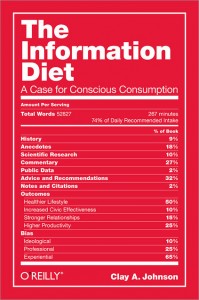For those of us working in higher education information technology, summer is not down time. Summer is a mad dash to update everything, to report on what we accomplished over the last year, and to make our plans for the coming one. Still, as active as it is, summer uses a different kind of energy, and it’s a nice time to put the blinders on and go.
 It’s also a good time to catch up with reading. This past weekend I read a slim book, The Information Diet: A Case for Conscious Consumption, by Clay A. Johnson. We’ve had speakers come to campus to talk about managing information overload, but Johnson’s book is different. While he does encourage us to consume less, he also wants us to consume better.
It’s also a good time to catch up with reading. This past weekend I read a slim book, The Information Diet: A Case for Conscious Consumption, by Clay A. Johnson. We’ve had speakers come to campus to talk about managing information overload, but Johnson’s book is different. While he does encourage us to consume less, he also wants us to consume better.
Johnson likens so much of the information we all consume to junk food. There’s lots of crappy stuff out there, and sadly, all of us are consuming it. What’s worse, the media companies are creating content that’s personalized for us. Liberal? MSNBC has just what you’re looking for. Conservative? Fox has you covered. Beyond that, however, Johnson looks into how media companies track internet search trends in real time, with freelance writers quickly writing and posting content that’s likely to draw us in.
The results? Media companies make a healthy profit as we click through “news stories” written just for people who have the same perspectives we do. They make cash from the ads that are displayed. Unfortunately for us, we aren’t reading information; we’re receiving affirmation of our biases. While groups have always had our differences, the level of anger in the conversation seems to get worse all the time. Why? Because both sides of any given position are being fed tidbits that reinforce their beliefs. Johnson, who quit his job with the Sunlight Foundation after he realized that putting the facts out there isn’t sufficient to support an educated political dialog.
Johnson encourages us to consume our information more carefully. Instead of clicking on the ehow.com link that will tell you just what you were hoping someone would tell you, try looking for information. Often that means you need to try to obtain the original source documents, or at least get as close as you can to them. Libraries, of course, are excellent for helping with this kind of thing. But perhaps I’m showing my bias there.
Read Johnson’s book yourself. See what you think. While I am not particularly interested in the web site efforts Johnson proposes in the late parts of his book, I do think it’s vital not only to politics, but to discourse in general that we seek information, not affirmation. After I finished reading, I took a walk through my bookmarks and removed several that I’ll be better off without.


